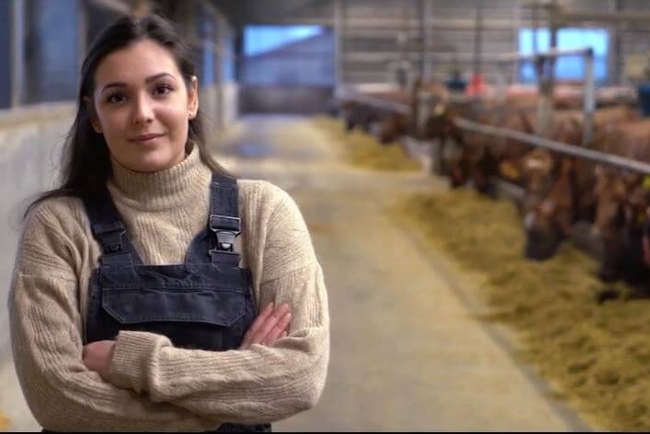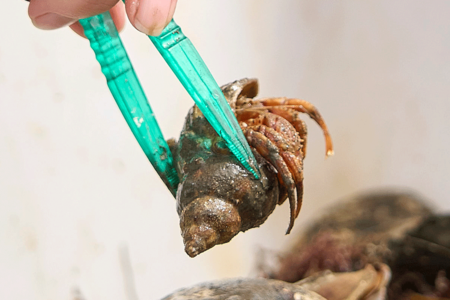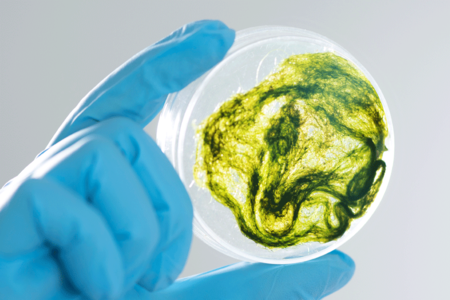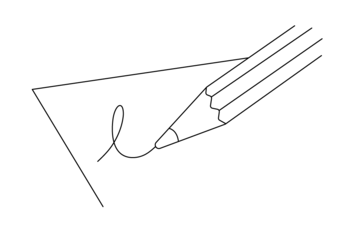About the programme
You study healthy animals such as production animals in agriculture, companion animals, horses or experimental animals. You will learn about sustainability, nutrition, breeding, genetics, animal behaviour and production management.
The last study start for the MSc in Animal Science at the University of Copenhagen will be in September 2026.
Afterward, the programme will transfer to the University of Aarhus.
What specialisations does the field of study offer?
During the training you will be challenged to analyse problems and develop sustainable solutions from a holistic perspective that pays regard to people, animals and the environment. Elective courses and the extensive thesis work allows you to specialise in an area of interest and create an academic profile.Why is this programme relevant?
As a Master in animal sciences, you are helping to shape the sustainable livestock production of the future. For example, you can work on food safety, production optimisation or development of sustainable fodder.Considering studying at UCPH this September?
Apply by 15 January if you are an applicant from outside the EU/EEA/Switzerland. Apply by 1 March if you are from the EUAdmission and application
To apply for admission to this master's degree programme, you must have completed, or expect to complete, a qualifying bachelor’s degree or a similar Danish or international degree programme which is assessed to be relevant. Apply for admission via the application portal.
Below, you can read more about admission requirements and which documents to upload in the application portal.
Academic admission requirements
Here you'll find the different academic requirements depending on which qualifying degree you hold.
You have legal right of admission if you have a
- Bachelor’s degree in Animal Science from from the University of Copenhagen
This means that you are guaranteed a place on the master’s programme in Animal Science if you apply in time to begin within 3 years after the completion of your bachelor’s degree.
You meet all academic requirements if you hold one of the degrees listed below:
- Bachelor’s degree in Agrobiology with a specialisation in Animal Biology and Production from Aarhus University
- Bachelor's degree in Veterinary Science
Note, that having a bachelor’s degree that automatically fulfil the admission requirements does not guarantee you admission to the programme.
If you have a bachelor’s degree, professional bachelor’s degree or equivalent from a Danish or international universities you are qualified for admission if your programme is within the following areas:
- Animal Science
- Biology
- Biology-biotechnology
- Veterinary Medicine
Furthermore, you must have passed the following courses:
- 7.5 ECTS within domestic animal nutrition
- 7.5 ECTS within domestic animal physiology
- 7.5 ECTS within statistical data analysis
To be admitted to the programme, you must hold a recent and relevant bachelor’s degree and meet the language requirements.
Typical contents of courses within Domestic animal nutrition
- Description of nutrients, digestibility and nutrient absorption in different segments of the gastrointestinal tract of domestic animals
- Nutrient metabolism in the different organs
- Balances of energy and nutrients
- Metabolism and utilization of protein, fat and energy in the whole organism
- Hormonal regulations of nutrients in tissue pools
- Appetite regulation
- Assessment of energy and nutrient requirement
- Nutrient contents in feed ingredients, feed evaluation and feed formulation
Typical contents of courses within Domestic animal physiology
- Basic physiology of body cavities of domestic animals
- Physiology of the locomotor system
- Physiology of the bones, nerves and sensory organs
- Physiology of the cardiovascular system
- Physiology of the lymphatic system
- Physiology of the digestive system incl. liver
- Physiology of the respiratory system
- Physiology of the skin and skin organs incl. lactation
- Physiology of the urinary tract
- Physiology of the reproductive organs
Typical contents of courses within Statistical data analyses
- Basic statistical concepts (variance, statistical model, estimation, testing, confidence intervals)
- Binomial distribution
- Normal distribution
- Comparison of random samples
- Single- and two-sided analysis of variance
- Regression analysis
- Linear models with factors, co-variants and random effects
- Repeated measures
Please note that having a bachelor’s degree that fulfil the admission requirements does not guarantee you admission to the programme.
You must have earned your bachelor’s degree within a maximum of 5 years prior to the start of the first semester of the master’s programme, e.g. for the intake in the autumn of 2026, you must have graduated by September 2021 or thereafter. In exceptional circumstances the Admissions Committee may waive the graduation year requirement.
If your bachelor’s degree is too old, you can apply for an exemption from the graduation year requirement. If you choose to apply for an exemption, you must submit the following documents along with your application for admission:
- A letter explaining how you have maintained your academic qualifications since graduation (e.g. relevant work, internships, further studies)
- Relevant documentation (e.g work contracts, diplomas etc).
If you already have a master's degree from Denmark or another country, you can, in principle, only be admitted to a new degree programme if there are places available on the programme for which you are applying for admission.
When we assess whether you meet the admission requirements for the master's degree program, Danish legislation only allows us to assess your bachelor's degree. Consequently, you cannot study supplementary courses between bachelor's and master's degree programs in order to meet the admission requirements.
If you have passed courses/projects before you complete the qualifying bachelor's degree, these can be included in the assessment, even though they are not part of the bachelor's degree program.
- It applies to courses/projects you have taken as single subjects and courses/projects you have taken as part of another study program.
- A maximum of 30 ECTS credits of these courses/projects may be included.
Language requirements
You are required to document that you fulfil the language requirement English B, unless you have a legal right of admission to the programme you are applying for.
Please note that you must have the documentation ready by the application deadline.
Maria is doing research on cattle feed based on by-products from insects.
Application deadlines
Applicants from within the EU, EEA and Switzerland
There are two application deadlines for Danish applicants and applicants from within the EU, EEA and Switzerland.
Study start in September
1 March at 23:59
The application portal opens on 16 January. You will receive a reply by 10 June.
Study start in February (legal right of admission only)
15 October at 23:59
The application portal opens on 2 September. You will receive a reply by 10 December.
Information about admission for studies starting in February 2027 will be published no later than 1 July 2026.
Applicants from outside the EU, EEA and Switzerland
There are two application deadlines for applicants from outside the EU, EEA and Switzerland.
Study start in September
15 January at 23:59
The application portal opens on 15 November. You will receive a reply by 1 May.
Study start in February (legal right of admission only)
1 September at 23:59
The application portal opens on 1 July. You will receive a reply by 1 December.
Information about admission for studies starting in February 2027 will be published no later than 1 July 2026.
How to apply
Choose your category and read how you apply for admission. You can also find information about deadlines and documentation requirements.
Please note that you must also select according to your citizenship:
- Citizen from Denmark, EU, EEA or Switzerland (EU)
- Citizen from countries outside EU, EEA or Switzerland (NON-EU)
Second application round is open from 1 - 15 May for applicants with legal right of admission.

How we assess your application
The programme accepts a maximum of 60 students.
Selection criteria
If the number of qualified applicants to the programme exceeds the number of places available qualified applicants will be prioritised according to the following criteria:
- Grade point average from your bachelor’s degree
- Relevant internships and/or work and relevant stays abroad
| Admission statistics Animal Science 2025 | |
|---|---|
| Admitted (of which have start in February) | 29 (5) |
| Admission distribution (legal right/other) | 83% / 17% |
| Applicants | 44 |
| Age average | 25 |
| Nationality (dk/international) | 83% / 17% |
Programme structure
The MSc programme in Animal Science is a 2-year programme taught in English, which helps you to obtain a strong international profile.
Meet a student at the MSc programme in Animal Science
Mathilde is a second-year student. Hear why she chose to study animal science, what surprised her, and the most difficult and best parts of the programme.
1st year
| Blok 1 | Blok 2 |
|---|---|
| Animals and Sustainability 7.5 ECTS | Restricted electives/electives 15 ECTS |
| Restricted electives/electives 7.5 ECTS |
| Blok 3 | Blok 4 |
|---|---|
| Livestock and Equine Production Science 15 ECTS | Restricted electives/electives 15 ECTS |
2nd year
| 1st & 2nd semester |
|---|
| Restricted electives/electives 15 ECTS |
| Thesis 45 ECTS |
At the faculty of Science and faculty of Health and Medical Sciences, you can choose between such different subjects:
- management of livestock
- ethology
- mammal genomics
- parasitology
- immunology
- biotechnology
- quantitative genetics and breeding
- animal experimental techniques
- nutrition and food quality
- business economics
- strategic advising and management
- project management
- big data processing etc.
You are also free to choose courses at other faculties at the University of Copenhagen and at other Danish or international universities.
Restricted elective courses:
Minimum 30 ECTS credits are to be covered by courses from the following list:
- Advanced Livestock and Equine Production Science
- Experimental Animal Nutrition and Physiology (EANP)
- Nutrition and Management of Companion and Exotic Animals
- Advanced Quantitative Methods in Herd Management
- Quantitative Genomics and Breeding
- Ethology
- Domestic Animal Parasitology
- Parasitic Zoonoses and One Health approaches
Electives
Besides the two compulsory courses and the restricted electives, the programme includes 22,5 ECTS for elective courses.
The thesis is the final part of your degree. It is your opportunity to concentrate on an academic problem which interests you, for seven months (45 ECTS). It can be both theoretical and practical and often it will contain independent experimental work or collection and analysis of data.
You can make the thesis in collaboration with the private sector, for instance by working on a real life problem and often such collaborations may lead to a job after graduation.
Programme Curriculum
If you are more interested in the academic content, regulations, and examination requirements, you should consult the curriculum, which serves as the legal foundation for the programme.
There is both a curriculum specific to each degree programme and a general curriculum that applies across the faculty.
Please note that curricula are often revised annually. Any new versions will be published no later than during the spring semester.
Career opportunities
Upon completion of the master’s programme, you will obtain the title Master of Science in Animal Science.
The programme aims to educate entrepreneurs and leaders to be in charge of and develop sustainable and innovative solutions for the future.
Graduates work within all sectors that have to do with the sustainable production, use, management, breeding etc. of healthy animals in healthy herds.
You will be able to create an academic profile by specialising in e.g.:
- animal production
- genetics and breeding
- animals used for sport purposes and leisure
- animals we study to improve our understanding of human biology and diseases.
The MSc in Animal Science is a quality education in English with a flexible study structure, excellent facilities and an international study environment.
The programme focuses on how:
- animal enterprises can become economically sustainable
- to feed, breed and house animals without compromising animal welfare or the surrounding environment
- new technologies and big data processing can be used to optimize production, breeding and management of livestock.
The programme gives you a general profile in Animal Science. You will acquire the following knowledge, skills, and competences:
Knowledge of
- the biological and management determinants of animal production
- constraints to animal production
- performance in animal husbandry systems
- factors influencing animal performance, welfare and longevity as well as maintenance of animal health
- impact of animal husbandry systems on environmental sustainability in a national and international context
- socioeconomic importance and impact of the animal sector and principles for regulation of the sector
- animal production theory
Skills
- handle complex issues in domestic animal science
- apply animal performance/production theory, e.g. for monitoring, analysis and planning of actual animal units across different animal species
- apply biological models and animal experimental techniques to quantify complex life processes underlying animal performance, from cellular to whole body level
- optimise animal husbandry/ production units from an animal welfare, economic and environmental perspective.
- evaluate and discuss sustainability of and technology use in animal based food production
- develop new solutions for optimization and improvement of performance, health and welfare status of animals, and the quality of their physical/technical environment
Competencies
- participate in public discussions of the impact of animals and animal production on society and environment
- work independently and effectively on an individual basis, as well as in project teams and interdisciplinary environments, cooperate with relevant partners, discuss solutions and reach consensus
- Reformulate existing theories, principles and research findings to generate new hypotheses and theories
- Use lifelong learning as a principle to evaluate and structure learning processes and assume responsibility for continuous professional development
You have various opportunities for specialisations, which opens up for a growing number of jobs within many different sectors, such as:
- The Agricultural Advisory Service, consulting engineering firms, the financial sector or international development organisations
- Development or sales jobs in the industry and production sector
- Industry associations or professional organisations relating to feeding, breeding, management of animals, and animal production
- Strategic advising and/or management of experimental animal businesses
- Public management (municipalities, regions, ministries and governmental bodies in Denmark, the EU and internationally)
- Research and education in private companies, governmental research institutions and universities
- Teaching at agricultural colleges, technical colleges or in other kind of course activities
- Starting your own business
Student life
The Animal Science programme is primarily based at Frederiksberg Campus which is a beautiful campus area with the option of joining many social activities.
At Frederiksberg Campus, you can find both the animal and veterinary sciences. It is located a few kilometres west of the city centre in beautiful green surroundings, and Frederiksberg is a popular residential area.
The Gardens, which are part of the Frederiksberg Campus, are popular with both students and locals. In the summer months, you can drop by Café Væksthuset, which located in an old greenhouse, for a cup of freshly brewed coffee and a delicious sandwich.
At the campus, you can join student clubs and societies of a more or less academic nature. Regardless of whether you are interested in choral singing, sports, the theatre or a special academic subject, there is a club for you.
Throughout the year, various social activities are arranged for all students at the faculty and for international students specifically. These activities include Introduction Days for new students, orientation programmes for international students, international dinners, courses, lectures, sports activities such as fun runs or bicycle races, and career workshops.
Students live in residence halls outside campus or share a flat in the Copenhagen area. It is easy to go to or move between the different campus areas. The relatively small size of Copenhagen makes it easy to get around, even by bike.
Contact student guidance
Questions about study choice and admission
Our student guidance are ready to assist you with answers to your questions about:
- application procedure and the digital application portal
- admission- and language requirements
- documentation
- study life
- career opportunities
- study choice or doubts
Did you not find what you were looking for?
You can find answers to questions most often asked by potential students in the FAQ. Read the FAQ
Questions about the digital application-portal?
Do you have questions about digital application? Check our user guide to the application portal.
In case of technical problems, please contact the IT-support by
- Mail: it-service@adm.ku.dk // Tel: +45 35 32 32 32
Location
- Frederiksberg Campus (the primary place of education), Bülowsvej 21, DK-1870 Frederiksberg.
- Taastrup Campus, Agrovej 8, DK-2630 Taastrup.





